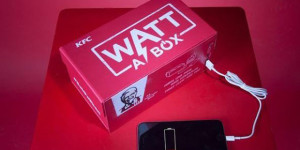I’ve complimented McDonald’s on being the only place for years one could get free wi-fi in Australia (still building the NBN I guess). We’ve gone to other local fast food joints when the power’s out, I’ve scammed free wi-fi from the random streets of France almost a decade ago (the VW dealer outside our friends’ apartment was uncharacteristically reliable) .
Kentucky Fried Chicken in India is so attuned to their customers’ needs they have crafted a meal box that comes with a pre-charged USB plug.
If you are planning to go to a local KFC there and order a box of chicken, you potentially don’t need to charge your phone ahead of time because you just might be handed a chicken box that will come with everything you need to stay connected during your meal.
The “Watt-A-Box” program, which the U.S.-based chain’s India branch launched in Delhi and Mumbai, is advertising its benefits with a ridiculous commercial that addresses the date planning interrupted by a dead phone situation described above.
While the limited edition boxes aren’t part of the regular menu, some were given away as part of an online competition, and some KFC fans received them as a bonus surprise from selected stores in Delhi and Mumbai.












